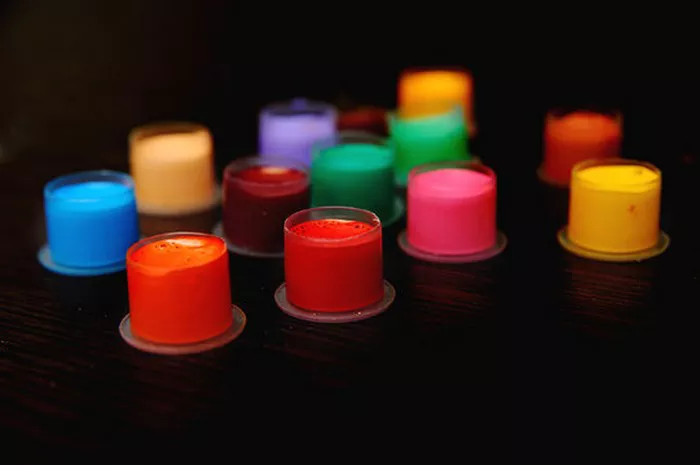Tattoo ink is an essential component of the tattooing process, providing the color and permanence that define a tattoo. Understanding what constitutes tattoo ink is crucial for anyone interested in the art form, whether you’re a professional tattoo artist or a client considering a new piece of body art. Tattoo ink primarily consists of two basic components: pigments and carriers. Pigments are the substances that give the ink its color, while carriers are the liquids that help distribute the pigments and ensure they stay in place during and after the tattooing process.
Professional Tattoo Ink
Professional tattoo ink is designed specifically for use in tattoos and is manufactured under stringent quality control standards to ensure safety and efficacy. These inks are produced by reputable companies and are subject to rigorous testing to comply with safety regulations.
Ingredients and Composition
Commercially available tattoo inks typically contain a variety of ingredients that contribute to their color, consistency, and stability. The pigments used in these inks are often derived from metal salts or organic compounds. For example, black tattoo ink usually contains carbon black, while red ink might use cadmium red or other pigments. Carriers in professional tattoo ink include water, alcohol, or glycerin, which help to dilute the pigments and maintain the ink’s flow and consistency.
Safety Standards and Quality Control
Professional tattoo inks adhere to strict safety standards. In many countries, tattoo inks must meet regulations set by health authorities to ensure they are free from harmful substances. These regulations often require manufacturers to provide a list of ingredients and to ensure that their inks do not contain hazardous chemicals. Quality control measures are in place to test inks for contaminants and to ensure consistency in color and performance.
Homemade Tattoo Ink
While professional tattoo inks are the safest option, some individuals consider making tattoo ink at home using common household items. Homemade tattoo inks often rely on natural substances or everyday materials.
Methods for Making Tattoo Ink
Wood Ashes: One traditional method involves using wood ashes. The ashes are mixed with water to create a paste, which can then be used as ink. The resulting color is typically a dark gray or black.
Graphite Powder: Another method is to use graphite powder, which can be mixed with water or other liquids to create a black ink. This method is less traditional but has been used by some for its availability.
Creating tattoo ink at home poses several risks. Homemade inks are often not sterile and can carry a high risk of infection. The ingredients used in homemade inks may also cause allergic reactions or adverse health effects. Additionally, the safety of these inks has not been tested or regulated, making them a potentially hazardous choice.
SEE ALSO: How to Thicken Tattoo Ink?
Safety and Health Considerations
The safety of tattoo ink is a paramount concern, whether the ink is professional or homemade. Here are some key considerations:
Sterility and Non-Toxicity
Tattoo ink must be sterile to prevent infections. Professional inks are produced in sterile environments and are packaged in ways that prevent contamination. Homemade inks, however, are often made in non-sterile conditions, increasing the risk of introducing harmful bacteria or fungi into the skin.
Health Risks
Using non-professional inks can lead to various health issues. Infections can occur if the ink is not sterile, and allergic reactions may arise from certain pigments or carriers. Long-term health effects are also a concern, as some pigments used in non-professional inks may contain harmful substances.
Consulting with Professionals
Before using any tattoo ink, especially homemade varieties, it’s crucial to consult with a professional tattoo artist. Professional artists can provide guidance on the safest and most effective inks and can ensure that the tattooing process adheres to health and safety standards.
Legal and Ethical Considerations
The use of tattoo ink is regulated in many regions to ensure public safety. Understanding these regulations and ethical considerations is important for both artists and clients.
Regulations and Guidelines
Different regions have varying regulations regarding tattoo ink. In some countries, tattoo inks must be approved by health authorities and meet specific safety standards. These regulations help protect consumers from harmful substances and ensure the quality of the inks used.
Ethical Considerations
Using non-professional inks, especially for permanent tattoos, raises ethical concerns. These inks may not have been tested for safety, potentially putting individuals at risk. Ethical tattooing involves using products that have been proven to be safe and effective.
FAQs about Tattoo Ink
Here are some common questions and concerns about tattoo ink:
1. What is the Longevity of Tattoo Ink?
Tattoo ink is designed to be permanent, although its appearance can change over time. Factors such as sun exposure, skin type, and aftercare can affect the longevity and vibrancy of a tattoo.
2. How Does Tattoo Ink Retain Its Color?
The pigments in tattoo ink are embedded into the dermal layer of the skin, where they remain stable over time. However, the color can fade due to external factors like UV exposure and the body’s natural healing processes.
3. Are There Side Effects to Using Tattoo Ink?
Side effects can include allergic reactions, infections, or skin irritation. Using high-quality, professional inks and following proper aftercare can minimize these risks.
Conclusion
Understanding what can be used as tattoo ink is essential for ensuring a safe and successful tattooing experience. While professional tattoo inks are designed to meet safety standards and provide reliable results, homemade inks pose significant risks due to their lack of sterility and testing. Always prioritize safety and consult with a professional tattoo artist to ensure the best possible outcome for your tattoo.
Related Topics

